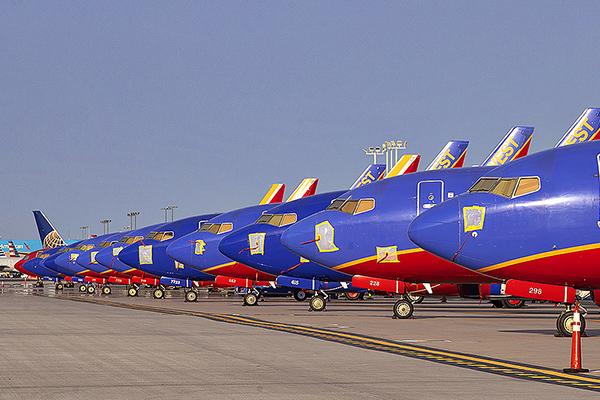
Southwest Airlines revised down its estimated capacity for the third quarter (Q3) of 2020, despite observing “modest improvement” in revenue and demand trends recently.
Dallas-based Southwest now expects Q3 capacity to be down 30-35% from 2019 levels, compared to a previously estimated decrease of 20-30%, according to an Aug. 19 market update.
August capacity is now estimated to be 27% lower year-over-year (YOY), compared to prior estimates that were down just 20%. That figure will drop to a 40% reduction in September, compared to a previous estimate of being down 20-25%. October schedules are expected to fall to a range of being 40-50% lower than last year.
To be sure, Southwest’s actual seat capacity is roughly a third lower than its published levels, once the 60% load factor cap in place through Oct. 31 across its fleet of Boeing 737s is taken into account.
The airline is seeing improvement in close-in leisure passenger demand and revised its projected operating revenues for August to a range of down 70-75% YOY from 2019, slightly better than previous estimates of down 75-80%. Load factors in August are now expected to be in the 40-45% range, ahead of the 30-40% initially forecast.
Bookings trends have also improved modestly for September. Operating revenues for the month are expected to advance slightly to a range of being down 65-75% YOY, with load factors edging up to 40-50%.
Southwest’s average cash burn in July came to $17 million per day, slightly better than previously expected losses of $18 million per day. The company now expects Q3 daily cash burn to be $20 million per day, compared to $23 million originally, due to reduced capacity and slightly improved demand trends.
The company also revealed it will not pursue a $2.8 billion loan it qualified for under the CARES Act, saying it can secure additional liquidity on more favorable terms elsewhere. The $25 billion pot of air carrier loans is separate from the Payroll Support Program (PSP), which funded most of carriers’ labor costs in the second and third quarters and is set to expire Oct. 1.
Southwest remains the only major U.S. carrier to commit to completely avoiding involuntary furloughs through year-end. Still, Southwest president and CEO Gary Kelly has voiced strong support for a union-backed proposal to extend the PSP until March 31, 2021, saying in a late-July video message that he has been “personally involved in delivering that message to our federal leaders.”





